Lymphoma is a type of cancer that affects the lymphatic system, which is a part of the body’s immune system. It is characterized by the abnormal growth of lymphocytes, a type of white blood cell.
While the exact cause of lymphoma is still unknown, research suggests that certain dietary and lifestyle factors may play a role in its prevention. In this article, we will explore the role of nutrition in lymphoma prevention and discuss some dietary strategies that may help reduce the risk of developing this disease.
1. A Plant-Based Diet
A plant-based diet is rich in fruits, vegetables, whole grains, legumes, and nuts. Numerous studies have shown that a plant-based diet is associated with a reduced risk of various types of cancer, including lymphoma.
Fruits and vegetables, in particular, are packed with vitamins, minerals, and antioxidants that help support a healthy immune system and protect against cellular damage.
2. Antioxidant-Rich Foods
Antioxidants are compounds that help protect cells from oxidative stress and damage caused by free radicals. Including antioxidant-rich foods in your diet may help prevent lymphoma by neutralizing harmful free radicals.
Examples of antioxidant-rich foods include berries, dark chocolate, pecans, kidney beans, and artichokes.
3. Omega-3 Fatty Acids
Omega-3 fatty acids are essential fats that have anti-inflammatory properties. Chronic inflammation has been linked to an increased risk of cancer, including lymphoma.
Including sources of omega-3 fatty acids, such as fatty fish (salmon, mackerel, sardines), flaxseeds, chia seeds, and walnuts, in your diet may help reduce inflammation and potentially lower the risk of lymphoma.
4. Avoid Processed Meats
Processed meats, such as hot dogs, bacon, and deli meats, have been classified as carcinogenic (cancer-causing) by the World Health Organization (WHO).
Consumption of processed meats has been linked to an increased risk of various types of cancer, including lymphoma. To reduce your risk, it is advisable to limit or avoid the consumption of processed meats.
5. Limit Added Sugars
Excessive consumption of added sugars has been associated with an increased risk of obesity, type 2 diabetes, and certain types of cancer. Including lymphoma in your diet. Sugar-sweetened beverages and desserts are common sources of added sugars.
It is important to limit these sugary foods and opt for healthier alternatives such as fresh fruits as a sweet treat.
6. Stay Hydrated
Staying hydrated is essential for overall health and may also play a role in lymphoma prevention. Drinking an adequate amount of water helps maintain optimal bodily functions, including the removal of toxins and waste products.
Aim to drink at least 8 cups (64 ounces) of water per day and adjust your intake based on activity levels and individual needs.
7. Cruciferous Vegetables
Cruciferous vegetables like broccoli, cauliflower, cabbage, and Brussels sprouts contain a compound called sulforaphane. Sulforaphane has been found to possess anticancer properties and may help reduce the risk of lymphoma.
Including a variety of cruciferous vegetables in your diet can provide you with these potential benefits.
8. Herbs and Spices
Herbs and spices not only add flavor to your meals but also offer a range of health benefits. Many herbs and spices possess antioxidant and anti-inflammatory properties that can help prevent cellular damage and reduce the risk of lymphoma.
Ginger, turmeric, garlic, and cinnamon are some examples of herbs and spices that you can incorporate into your daily cooking.
9. Maintaining a Healthy Weight
Obesity is a risk factor for various types of cancer, including lymphoma. It is important to maintain a healthy weight through a balanced diet and regular physical activity to reduce the risk of developing lymphoma and other chronic diseases.
Aim for a body mass index (BMI) within the healthy range and consult a healthcare professional for personalized dietary and exercise recommendations.
10. Seek Professional Guidance
While making dietary changes is beneficial for overall health and lymphoma prevention, it is essential to seek guidance from a healthcare professional or registered dietitian.
They can provide you with personalized nutrition advice based on your individual needs, medical history, and any existing conditions or medications that may impact your dietary choices.




























